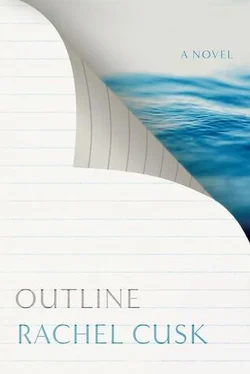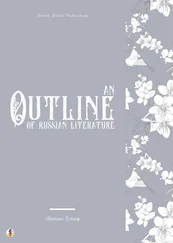‘My sister’, she said, ‘complimented her friend on this stunning effect, and the friend admitted that in fact she had borrowed the idea from another friend, who had had her kitchen refurbished some months before. Since then, however, a most terrible thing had happened. The friend’s friend had invited a large number of guests to dinner. Shortly before their arrival she had noticed a tiny crack in the glass of the panel, as though something small but sharp had fallen on it from above. She was annoyed, because the panel had cost a considerable amount of money, and being all of one piece she didn’t see any alternative but to replace the whole thing, despite the fact that only one small area had been affected. The guests arrived, and during the course of the evening an incredible storm came in over Athens. The rain came down in torrents as the group sat and ate beneath the glass panel. They were marvelling at the acoustic and visual effect of the water on the glass when, with a great groaning and creaking, the whole thing suddenly collapsed on top of them, the flaw in the glass apparently having weakened the structure to the point where it could not bear the weight of the water falling on it.’
The woman paused. ‘This,’ she said, ‘you will recall, was told to me by my sister over the telephone, a story that neither affected her nor, strictly speaking, concerned her. And since no one, amazingly, was hurt, it wasn’t a story that would shock people and that you would tell for that reason. Nor did it really affect the friend who had told it to her in the first place, except by association, because she had a panel in her ceiling of the same type. So I received it, as it were, third-hand, but it is as real to me as if I had experienced it myself. All morning I was troubled by it. Yet like most people I hear of terrible occurrences — nearly all of them far worse — every day, through the newspapers and the television, and I wondered why this one had taken a place in my mind among my own memories and experiences, so that I was having difficulty telling them apart. The reality of my life is largely concerned with what are called middle-class values — the people that I know refurbish their houses often, as I do myself, and they invite other people to these houses for dinner. But there is a difference, because the people in the story sound a little grander than the people I know, most of whom could not afford to put a glass panel in the ceiling, though they would very much like to. My sister, however, moves in slightly more exalted circles than I do: this is something I am aware of as a source of tension in our relationship. I am, I admit, slightly jealous of her social life and of the kinds of people she meets, and sometimes I think she could do more to include me in the more interesting world she inhabits.
‘The second reason,’ she continued, ‘has to do with the story itself, and with the tiny flaw in the glass panel that eventually led to its entire collapse under pressure: the actual pressure of the water, and the more mysterious and intangible pressure of the people beneath it, who were admiring it while assuming absolutely that it would hold. When it did not, it became the cause of unutterable damage and destruction, almost an instrument of evil, and the symbolism of this arrangement of facts has a certain significance for me.’ She was silent for a while, the juddering second hand moving around the clock face above her head. I looked at my chart and found that her name was Penelope. ‘I would like’, she resumed, ‘to see the world more innocently again, more impersonally, but I have no idea how to achieve this, other than by going somewhere completely unknown, where I have no identity and no associations. But how such a thing could be accomplished, and even where such a place might be, I have no idea; not to mention the relationships and responsibilities themselves,’ she concluded, ‘which drive me mad but at the same time make escape from them impossible.’
Each member of the group had now spoken, except for one, a woman whose name on my chart was Cassandra and whose expression I had watched grow sourer and sourer as the hour passed, who had made her displeasure known by a series of increasingly indiscreet groans and sighs, and who now sat with her arms implacably folded, shaking her head. I asked her whether she had anything, before we concluded, to contribute, and she said that she did not. She had obviously been mistaken, she said: she had been told this was a class about learning to write, something that as far as she was aware involved using your imagination. She didn’t know what I thought had been achieved here, and she wasn’t all that interested in finding out. At least Ryan, she said, had taught them something. She would be asking the organisers to refund her money, and would make damn sure they got her feedback. I don’t know who you are, she said to me, getting to her feet and collecting her things, but I’ll tell you one thing, you’re a lousy teacher.
My neighbour asked whether I’d had time to do any sightseeing yet. We were in the car again, on the rackety road to the marina, with the windows down and his shirtsleeves flapping madly in the breeze.
I said that I had visited Athens several times before, and was familiar with the sights, though that did not altogether explain why I had as yet felt no urge to seek them out. He was surprised: he hadn’t realised I’d been here so often. He himself went to London, for example, all the time, but for some reason it hadn’t occurred to him that the same principle could work in reverse. When was the last time I had come? Three years ago, I said. He was silent for a while, his small eyes narrowed with a faraway look on the horizon.
‘Three years ago,’ he said musingly. ‘At that time, I had just moved back to Athens myself.’
I asked where he had gone to, and why, and he said that he had spent a period living and working in London. He had been offered a very good job by a bank there, he continued, and though he didn’t particularly want to give up the freedom of his life here, and especially his boat, he had a sense it might be the last such offer that came his way. And Athens at the time seemed full of his failures, or at least of things that had come to an end and in which he could find no possibility of renewal. In fact, he felt quite surprised, he said, to have been offered this job, because his opinion of himself had become very low. That is always a dangerous moment, he said, to make a big decision, when you are not sure of what you deserve. Evidently his friends shared his opinion, because all of them urged him, without hesitation, to take it. It is interesting how keen people are for you to do something they would never dream of doing themselves, how enthusiastically they drive you to your own destruction: even the kindest ones, the ones that are most loving, can rarely have your interests truly at heart, because usually they are advising you from within lives of greater security and greater confinement, where escape is not a reality but simply something they dream of sometimes. Perhaps, he said, we are all like animals in the zoo, and once we see that one of us has got out of the enclosure we shout at him to run like mad, even though it will only result in him becoming lost.
I said his image reminded me of a scene from an opera I liked — in fact I had found a recording of it in Clelia’s apartment — called The Cunning Little Vixen, in which a fox is caught by a hunter and kept in a farmyard with the other animals. He keeps her because he loves her, despite the fact she is destructive, and there is a value for her too in his attention, though its consequence is her captivity. But her nature drives her to seek the wild, and one day she escapes the farmyard and finds her way back into the forest; but instead of feeling liberated she is terrified, for having lived in the farmyard most of her life she has forgotten how to be free. He was not familiar with that opera, my neighbour said; he, however, approached the prospect of the job in London with a reverse kind of fatalism, as though the very freedom of his life was something for which he was at last going to pay by going into harness. He, the scion of playboys and millionaires, would finally observe the penal servitude of a nine-to-five: he sold his house in Athens, bought a small flat in an upmarket part of the English capital, and took the boat out of the water. It is the only time, he said, in the twenty-five years of its history that the boat has left the element in which it lives. He had made arrangements for it to be stored in a warehouse in the centre of Athens; it is difficult, even now, for him to convey the emotion he felt watching it be lifted out of the sea and placed on a flatbed truck, which he drove behind all the way in his car, and then interred in its container deep in the city. And then off he went to London, sensing that he himself was about to suffer much the same fate.
Читать дальше












